3定语从句
- 格式:doc
- 大小:39.50 KB
- 文档页数:3

定语从句(3)从句的本质从句的本质是:句子作成分/词类在简单句中,成分都是由单词或短语充当的:I know you.主语是I ;谓语是know ;宾语是youI enjoy reading novels.主语是I ;谓语是know ;宾语是reading novels(动宾短语)I know he is ill.主语是I ;谓语是know ;宾语是he is ill(句子)我们可以看出:最后的句子He is ill 是作了句子成分的,作宾语,因此可以叫它为“宾语从句”从另一个角度来说:这个句子相当于一个名词,因此可以叫做“名词性从句”That she finished reading an English novel surprised us all.上面的句子当中,句子She finished reading an English novel作了主语,因此叫“主语从句”,也相当于名词,还可以叫做“名词性从句”She finished reading an Englishnovel yesterday. She finished reading an Englishnovel at the age of 12.She finished reading an Englishnovel when she was 12.从上面的变化情况我们可以看出,从单词作成分,短语作成分到句子作成分,作的都是状语,因此从句叫“状语从句”,或叫“副词性从句”。
The little girl finished reading an English novel. The girl in school uniform finished reading an English novel.The girl who is 12 finished reading an English novel.从上面的变化情况我们可以看出,从单词作成分,短语作成分到句子作成分,作的都是定语,因此从句叫“定语从句”,或叫“形容词性从句”。




英语三大从句在英语中,主要有三大从句,即名词性从句包括主语从句,宾语从句,表语从句,同位语从句、形容词性从句即定语从句、副词性从句即状语从句,包括时间、条件、结果、目的、原因、让步、地点、方式等;定语从句一、关系代词引导的定语从句关系代词代替前面的先行词,并且在定语从句中充当句子成分,可以作主语、宾语、定语等;常见的关系代词有:who, that, which;它们的主格、宾格和所有格如下表所示:一关系代词who, whom和 whose的用法who代替人,是主格,在定语从句中作主语;An architect is a person who designs buildings. 建筑师是设计房屋的人;whom代替人,是宾格,在定语从句作宾语,在非正式英语常可省略;Do you know the gentleman whom we met in the school library yesterday 昨天我们在学校图书馆里遇到的那位先生你认识吗whose一般代替人,有时亦可代替物,是所有格,在定语从句作定语;The girl student whose father is a senior engineer used to study abroad. 其父是一位高级工程师的那个女学生过去在国外留学;Do you know the name of the hotel whose window we can see here 我们这儿能看到窗户的那个宾馆叫什么名字,你知道吗关系代词whose指代先行词hotel,正式用法应该用of which;whose window=the window of which,意思是:the window of the hotel;二关系代词which的用法which代替物,在定语从句作主语或宾语,作宾语时还可省略;I do not like stories which have unhappy endings.我不喜欢有不幸结局的小说;which可以换成that三关系代词that的用法that既可指人又可指物,在当代英语中大多指物,在定语从句作主语或宾语,作宾语时还可省略;: Is she the girl that sells newspapers她是卖报纸的那个女孩吗that可以换成whoWhere is the ice-cream that was in the fridge放在冰箱的冰激凌哪儿去了that可以换成whichIs this the book that you want to buy这是你要买的那本书吗 that可以换成which,在定语从句作宾语,还可以省略二、关系副词引导的定语从句常用的关系副词只有三个:when, where, why,在定语从句中充当时间、地点和原因状语;一关系副词when的用法关系副词when代替的先行词表示的是时间,when在定语从句作时间状语;In Beijing July and August are the months when it rains very often.北京的七月和八月是常下雨的月份;when先行词是months二关系副词where的用法关系副词where代替的先行词表示的是地点,where在定语从句作地点状语;During the Spring Festival I went back to the town where I was brought up.春节期间,我回到了生我养我的家乡;where的先行词是town三关系副词why的用法关系副词why代替的先行词表示的是原因,why在定语从句作原因状语;The reason why I am phoning you is to ask you whether you have got my email.我打电话给你的原因是想问问你是否收到了我的电子邮件;why先行词是reason, 当代英语里why可以用that替代,这时关系代词that就变成了表示原因的关系副词,还可以将why省略三、特殊关系代词as引导的定语从句一在固定搭配as…as, so…as, such…as, the same…as中,as引导定语从句You may take as many books as you want.你想要拿多少书就拿多少;第一个as是副词,修饰many的;第二个as才是关系代词,代替先行词books,在定语从句中作宾语二独立于主句之外,as引导定语从句As we know/ As is known to us, the earth turns around the sun. 正如我们所知,地球围绕太阳旋转;As we know和 As is known to us均为定语从句,as分别作宾语和主语,替代后面的主句;Taiwan is, as you know, an inseparable part of China.你知道,台湾是中国不可分割的一部分;关系代词as指代整个主句,在定语从句中作宾语;四、关系代词who, which与that的区别一关系代词who与that的区别1. 当关系代词用作主语时,多用主格who;He who loses hope loses all.失去希望的人就失去一切;先行词为代词he, they, any, all, one等时,多用whoI met Alice, who told me that she was learning Chinese.我遇见艾丽斯,她告诉我她在学汉语;在非限制性定语从句中,用who2. 当关系代词用作介词后的宾语时,用宾格whom,不用that;The man to whom our headmaster talked just now is our English teacher.我们校长刚才与他谈话的那个人是我们的英语老师;介词与关系代词紧密相连时,只能用宾格whom,不可用主格who注意:介词与关系代词不是紧密相连时,或者说介词放在句子后面时,这时可以用主格who,也可用that,还可以省略关系代词;因此,上面的这句话还可以有如下四种说法:1 The man whom our headmaster talked to just now is our English teacher.2 The man who our headmaster talked to just now is our English teacher.3 The man that our headmaster talked to just now is our English teacher.4 The man our headmaster talked to just now is our English teacher.3. 当关系代词泛指人时,多用that;He is a man that is never afraid of failure.他是个从不怕失败的人;that用来泛指人4. 当关系代词出现在who开头的疑问句时,应用that;例如:Who is the girl that is talking to Tom in English用英语同汤姆交谈的那个女孩是谁避免重复使用who,以免造成误解或语义含混不清二关系代词which与that的区别1. 当先行词为all, much, little以及不定代词anything, something, everything等时,关系代词多用that;All that glitters is not gold. 闪闪发光物,未必尽黄金;She told me everything that she knew. 她把她所知道的一切都告诉了我;2. 当先行词的前面有形容词最高级、序数词或限定词the only, the very, all, every, any, no 等时,关系代词一般都用that;This is the best novel that I have ever read. 这是我读过的最好的一部小说;He is the only person that has been invited to the ball. 他是惟一应邀参加舞会的人;3. 当关系代词出现在which开头的疑问句时,应用that;Which was the hotel that was recommended to the foreign guest 哪一个是推荐给外宾的宾馆这里使用that很明显是为了避免重复which4. 在非限制性定语从句中,关系代词一般只用which;Beijing, which is the capital of the People’s Republic of China, will host the 2008 Olympic Games. 北京是中华人民共和国的首都,将主办2008年奥运会;5. 介词后的关系代词用which,而不用that;She has collected 600 stamps, 60% of which are German stamps. 她收集了600张邮票,其中60%是德国邮票;五、定语从句的位置如前所述,定语从句一般总是直接置于所修饰的名词或代词之后;有时候,定语从句与先行词之间插入了其他的短语,这样它们被分隔了,这种情况下的定语从句被称作隔离定语从句;There was a girl upstairs who was shouting and crying, obviously mad.楼上有一个女孩,大喊大叫;很明显,她疯了;定语从句who was shouting and crying修饰the girl,被upstairs所隔开A new master will come tomorrow who will teach you German.明天要来一位新老师教你们德语了;定语从句置于句末以示强调名词性从句宾语从句一、引导词1由that 引导的陈述句性的宾语从句,在很多动词如say, think, wish , hope, see, believe, agree, expect, hear , feel等动词后;连词that只起连接作用,在从句中不做句子的成分,也无词汇意义,在口语中常被省略;如:I told him that he was wrong.在think, believe, suppose, expect等动词引起的宾语从句中,有时谓语尽管是否定意义,却不用否定形式,而将think 等动词变为否定形式;见语法:否定转移如:I don’t think you are right. 我认为你做的不对在许多带有复合宾语的句子中,that引导的宾语从句经常移到句子的后面,而用it做形式宾语;We think it wrong that he told a lie to everyone 我认为他向每一个人撒谎是错误的2 由连词if、 whether 引导的表示“是否…”的宾语从句;Whether, if 在从句中不做句子的成分,一般情况下,whether和if 可以替换;I don’t know if/whether he will come tomorrow.在介词后面的宾语从句中不用if引导Everything depends on whether we have enough money.宾语从句中有or not时不用if引导.I don’t know whether the movie star will come or not.和不定式连用作宾语时不用if引导Whether to go there or not hasn’t been decided.3由wh-引导的宾语从句;连接代词who, whom, whose, what, which和连接副词when, where, why, how 等连接的宾语从句,它们在句中即有连接从句的作用,又在句中充当句子的成分;Do you know which film they are talking about which做定语I don’t know where he lives. where 做地点状语二、宾语从句的语序,宾语从句的语序必须是陈述语序,既连接词+主语+谓语+其他成分 I believe that they will come soon.特例:有下列常见的问句,作为从句出现,是“不改变语句顺序”的;1. What's the matter2. What's wrong3. What's up4. What's the problem5. What's your trouble三、宾语从句的时态;宾语从句的时态受主句的限制,即:主句是一般现在时态,从句根据实际情况而定;主句是一般过去时态,从句用相应的过去的时态;如果从句的动作发生在主句之前,则从句要用过去完成时态;1 She says that she is a student.→ She said that she was a student.2She says that she will fly to Japan in a week. → She said that she would fly to Japan in a week.3She says that she has finished her homework alre ady. → She said that she had finished her homework already.1如果宾语从句说的是客观真理、自然现象或事实时,这时宾语从句要用一般现在时态;The teacher said that the earth goes round the sun.2Could you tell me…是用来征询对方的意见,语气委婉,并不表示过去;Could you tell me when we will visit the History Museum注意事项:3由陈述句变成宾语从句时,要注意人称的变化;She said: “I have been to England before.” → She said that she had been to England before. She asked me: “Do you like maths” → She asked me if I liked maths.4宾语从句与简单句的交换;由连接代词和连接副词引导的宾语从句,如果宾语从句的主语和主句的主语是同一个人时,可以用“疑问词+不定式”做宾语的简单句结构;I don’t know what I should do next. → I don’t know what to do next.DO SOME EXERCISES:you see AA. what he’s readingB. what is he readingC. what does he readD. he reads what2. Does Jack come from Japan Do you know合并成一个句子Do you know ___that__Jack __come___from Japandid your son say in the letter_He told me that he_D__ the Disney the next day.A. will visitB. has visitedC. is going to visitD. would visit4. He didn’t know___A____A. what’s the matterB. what the matter isC. what was the matterD. what the matter was5. Somebody called you just now, but I didn’t know__D__A. who were theyB. who they wereC. who was itD. who it was6. I want to know___D__A. what is his nameB. what’s his nameC. that his name isD. what his name is7. ---Could you tell me __C__she is looking for---Her cousin, Susan.A. thatB. whose C .who D. which8. ---What are you searching the Internet for---I’m trying to find out____.A. What is the difference between SARS and BIRDFLUB. How many persons have died in IraqC. How to protect our environmentD. Why is our Chinese team be able to beat Korea同位语从句一一般来说,在主从复合句中,用作同位语的从句叫同位语从句;它通常跟在某些名词之后,用以说明或解释该名词表示的具体内容;可以跟同位语从句的名词通常有:advice, decision, fact, hope, idea, information, message, news, promise, proposal, reply, report, suggestion, word消息,problem, question, doubt, thought等;eg: They were delighted at the news that their team had won.当听到他们队获胜的消息时,他们欣喜若狂;有时同位语从句可以不紧跟在被说明的名词后面,而被别的词隔开; 如:The thought came to him that Tom might have returned the book.他突然想起汤姆可能已经还了书了;二引导词1. The news that Mr. Li will be our new English teacher is true.2. He hasn’t made the decision whether he will go there.3. The question who should do the work is being discussed at the meeting.4. I have no idea what the boy is doing in the next room now.5. We haven’t yet settled the question where we are going to spend our summer vacation this year.6. I have no idea how I can get to the railway station.7. I have no idea when he will be back.小结:① that引导同位语从句时无词义,也不充当任何成分,但通常不可以省略,如句1;② whether引导同位语从句时意为“是否”,通常不能用if来代替, 如句2;③ 连接代词who, what等可以引导同位语从句,如句3, 4;④ 连接副词where, how, when等可以引导同位语从句, 如句5,6,7;三 that 引导的同位语从句和定语从句① 意义不同:同位语从句用来进一步说明前面名词的内容;而定语从句用来修饰、限定前面的先行词;试比较:1. The news that our team has won the final match is encouraging.2. The news that you told us is really encouraging.② that的功能不同:that引导同位语从句时是一个纯连词,不充当任何成分;而引导定语从句时,不仅起连接作用,而且还指代先行词并在从句中充当主语、宾语等成分;试比较:1. Dad made a promise that he would buy me a CD player if I passed the English test.2. Dad made a promise that excited all his children.③ 可否省略:that在引导同位语从句时,通常不可省略;在引导定语从句时,若在从句中作宾语,通常可以省略,若作主语则不可以省略;DO SOME EXERCISES:I. 请用适当的词填空,使下列句子意思完整;1. They expressed the hope _that_ they would come over to China soon.2. The fact ___that____ he didn’t see Tom this morning is true.3. Word has come __where_____ some American guests will come to our college for a visitnext week.4. He can’t answer the question ___how____ he got the money from his home yesterday.5. Do you have any idea __what___ is actually going on in the classroom6. The problem _______ we should have the meeting in the hall now must be decided at once. II. 下列各句中均有一处错误,请改正;1. Our team has won the game, that made us very happy.2. I’ve come with a message from Mr Wang how he won’t be able to see you this afternoon.3. He must answer the question if he agrees with what she said or not.4. I’ve read the book where you gave me the day before yester day.5. One of the men heldthe opinion when what the book said was right.表语从句表语从句只能置于主句之后,而主句的动词只能是连系动词;名词性从句在be等系动词后作表语时被称为表语从句The problem is how we can get the things we need.问题是我们怎样能弄到我们需要的东西;how 在表语从句中充当方式状语The scissors are not what I need. 这把剪刀不是我所需要的;what 在表语从句中充当宾语What I told him was that I would find him a good play. 我告诉他的是我会给他找个好剧本;what 在主语从句中作直接宾语, that作为表语从句的引导词在该表语从句中不充当句子成分, 不能省略That is what I want to tell you.那就是我想要对你讲的;what在表语从句中充当直接宾语That is why she failed to pass the exam. 那就是她考试不及格的原因;why 在表语从句中充当原因状语“That is why...”是常用句型, 意为“这就是……的原因/因此……”, 其中why引导的名词性从句在句中作表语, 该句型通常用于针对前面已经说明过的原因进行总结下面是两个与“That is why...”形式相似的结构, 它们与“That is why...”结构之间的关系要能够辨析清楚:1“That is why...”与“That is the reason why...”同义, 只不过从语法结构上讲, “That is the reason why...”中why引导的是—个定语从句, 将其中的the reason去掉则与“That is why...”结构一样 That is the reason why I cannot agree.2“That is because...”句型中从属连词because引导的名词性从句在此作表语, 这也是个常用句型, 意为“这就是为什么……/因为……”;“That is because...”与“That is why...”之间的不同在于“That is because...”指原因或理由, “That is why...”则指由于各种原因所造成的后果He did not see the film last night. That is because he had to help his little sister with her homework.昨天晚上他没有去看电影, 那是因为他得帮助他的妹妹做作业;第一句话说明结果, 第二句话说明原因He had seen the film before. That is why he did not see it last night.他以前曾看过那部电影, 因此他昨天晚上没有去看;第一句话说明原因, 第二句话说明结果考题1The traditional view is ____ we sleep because our brain is “programmed” to make us do so. 2007上海A. whenB. whyC. whetherD. that考题2You are saying that everyone should be equal, and this is ____ I disagree. 2004A. whyB. whereC. whatD. how考题3— I drove to Zhuhai for the air show last week.— Is that ____ you had a few days off 1999A. whyB. whenC. whatD. where考题4____ made the school proud was ____ more than 90% of the students had been admitted to key universities. 2003上海春A. What; becauseB. What; thatC. That; whatD. That; because考题5—Are you still thinking about yesterday’s game—Oh, that’s ____. 2003北京春A. what makes me feel excitedB. whatever I feel excited aboutC. how I feel about itD. when I feel excited表语从句与宾语从句的关系宾语从句和表语从句都属于名词性从句;其作用跟名词在句中的作用相同;故充当宾语的句子叫宾语从句,充当表语的句子叫表语从句;宾语从句1对于宾语从句要掌握以下三点①语序: 从句的语序必须是陈述句语序, 即“主语 + 谓语”这种形式;②时态: 当主句是一般现在时或一般将来时的时候, 从句可以是任何时态, 而当主句是一般过去时的时候, 从句时态必须是过去时范围的时态, 即一般过去时, 过去进行时, 过去完成时, 过去将来时;③连接词: 当从句意思完整, 主句意思肯定时, 连接词用that, 且可以省去当从句意思完整, 主句意思不确定或含否定含意时, 常用if或whether是否当从句意思不完整时, 连接词则是代替不完整部分的特殊疑问词;表语从句在句子中起表语作用的从句叫做表语从句,位于主句系动词的后面;表语从句的引导词和主语从句的引导词相同;也是名词性从句的一种;What the police want to know is when you entered the room.警察想知道的是你什么时候进的房间;The trouble is that we are short of funds困难是我们缺乏资金;This is what we should do这是我们应当做的;That is why I want you to work there那就是我要你在那儿工作的原因;His first question was whether Mr. Smith had arrived yet他的第一个问题是史密斯先生到了没有; 从句中的疑问句用正常语序,即陈述语序;as if, as though, because也可用来引导表语从句;She seems as if she had done a great thing她看起来好像做了一件大事;It is because you eat too much那是因为你吃得太多了;状语从句一状语从句的种类1.时间状语从句2.地点状语从句;3.原因状语从句;4.条件状语从句;5.目的状语从句;6.让步状语从句;7比较状语从句;8.程度状语从句;9.方式状语从句;10.结果状语从句;二状语从句的时态一般情况下,时间和条件状语从句的谓语动词一般用“一般现在时”表示“一般将来时”,用“现在完成时”表示“将来完成时”;1时间状语从句1.由when, while, as引导的时间状语从句;when, while和as的区别:when引导的从句的谓语动词可以是延续性的动词,又可以是瞬时动词;并且when有时表示“就在那时”;While引导的从句的谓语动作必须是延续性的,并强调主句和从句的动作同时发生或者相对应;并且while有时还可以表示对比;While my wife was reading the newspaper, I was watching TV.As表示“一边……一边”,as引导的动作是延续性的动作,一般用于主句和从句动作同时发生;as也可以强调“一先一后;As we was going out, it began to snow.当我们出门时,开始下雪了;as强调句中两个动作紧接着先后发生,而不强调开始下雪的特定时间2.由before和after引导的时间状语从句;before引导的从句不再用否定式的谓语,并且当before引导的从句位于主句之后,有时译成“就,才”; 时态:当主句用将来时,从句总是用现在时;如果before引导的从句谓语用的是过去时,则主句动词多用过去完成时,这样以便体现动作发生的先后;After表示主句动作发生在从句动作之后;主句和从句的动作的时间关系正好与before引导的从句相反;3.由till或until引导的时间状语从句;till和until一般情况下两者可以互换,但是在强调句型中多用until;并且要注意的是:如果主句中的谓语动词是瞬时动词时,必须用否定形式;如果主句中的谓语动词是延续性动词时,用肯定或否定形式都可以,但表达的意思不同;4.由since引导的时间状语从句;since引导的从句的谓语动词可以是延续性的动词,又可以是瞬时动词;一般情况下,从句谓语动词用一般过去时,而主句的谓语动词用现在完成时;但在It is +时间+since从句的句型中,主句多用一般现在时;5.由as soon as, immediately, directly, instantly, the moment, the instant, the minute, 等引导的时间状语从句;这些连词都表示“一……就”;hardlyscarcely, rarely…when / before, no sooner…than相当于as soon as之意;主句用过去完成时,从句用一般过去时;当hardly, scarcely, rarely和no sooner位于句首时,主句应用倒装语序;6.由by the time引导的时间状语从句;时态的变化:在一般情况下,如果从句的谓语动词用一般过去时,主句的谓语动词用过去完成时;如果从句的谓语动词用一般现在时,主句的谓语动词用将来完成时;7.由each time, every time和whenever引导的时间状语从句;8.由as long as和so long as引导的时间状语从句;这两个连词表示“只要;和…一样长”;2地点状语从句地点状语从句一般由连接副词where, wherever等引导,已经形成了固定的句型,:句型1:Where+地点从句,there+主句;此句型通常译成“哪里……哪里就……”;主句在从句后面时,there可用可不用;如果主句在从句的前面时,一般都不用there;句型2:Anywhere/ wherever+地点从句,+主句;状语从句是句子的状语由一个从句充当,来修饰主句中的动词,形容词或副词等;状语从句都由从属连词引导,与主句连接,放在句末时,一般不在前面加逗号;3原因状语从句: because, since, as和for都表示原因;because语势最强,回答why提出的问题,用来说明人所不知的原因;当能够很明显的看出原因或人们已知原因,就用as或since;由because引导的从句如果放在句末,且前面有逗号,则可以用for来代替;但如果不是说明直接原因,而是多种情况加以推断,就只能用for;4目的状语从句:表示目的状语的从句可以由in order that, so that,等词引导;5结果状语从句:结果状语从句常由so...that 或 such...that引导,首先要了解so和such后面分别跟什么词;such是形容词,修饰名词或名词词组,so是副词,只能修饰形容词或副词;so 还可与表示数量的形容词many, few, much, little连用,形成固定搭配;The box is so heavy that I can't carry it.6让步状语从句:是由though, although 引导的状语从句;。

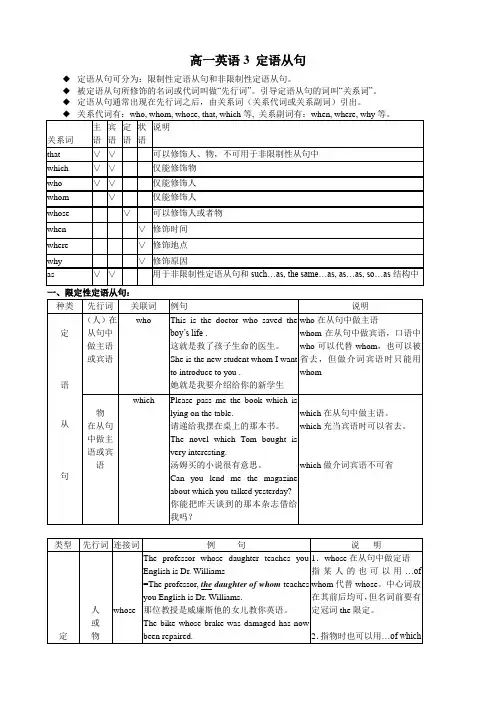
高一英语3 定语从句◆定语从句可分为:限制性定语从句和非限制性定语从句。
◆被定语从句所修饰的名词或代词叫做“先行词”。
引导定语从句的词叫“关系词”。
◆定语从句通常出现在先行词之后,由关系词(关系代词或关系副词)引出。
一、限定性定语从句:注:先行词是time, minute, moment, next time很少用关系副词when,可用that 但通常省去。
二、关系副词引导的定语从句关系副词可代替的先行词是时间、地点或理由的名词,在从句中作状语。
关系副词when, where, why的含义相当于"介词+ which"结构There are occasions when(on which)one must yield.任何人都有不得不屈服的时候。
Beijing is the place where(in which)I was born.北京是我的出生地。
Is this the reason why (for which)he refused our offer?这就是他拒绝我们帮助他的理由吗?三、如何判断关系代词与关系副词比较:This is the mountain village __________ I stayed last year.This is the mountain village __________ I visited last year.比较: I'll never forget the days ____________ I worked together with you.I’ll never forget the days ____________ I spent in the countryside.1. The house, _____ was destroyed in the terrible fire, has been repaired.A. the roof of whichB. which roofC. its roofD. the roof2. Can you lend me the novel _____ the other day?A. that you talkedB. you talked about itC. which you talked withD. you talked about3. The matter _____ you were arguing about last night has been settled.A. thatB. whatC. whyD. for which4. They talked for about an hour of things and persons _____ they remembered in the school.A. whichB. thatC. whoD. whom5. Who _____ has common sense(常识)will do such a thing?A. whichB. whoC. whomD. that6. All the apples _____ fell down were eaten by the pigs.A. thatB. thoseC. whichD. what7. They asked him to tell them everything _____ he saw at the front.A. whatB. thatC. whichD. where8. I’ll tell you _____ he told me last night.A. all whichB. all whatC. that allD. all9. A child _____ parents are dead is called an orphan.A. whoB. who’sC. whoseD. which10. Is this the museum _____ you visited the other day?A. thatB. whereC. in whichD. the one11. Is this museum _____ some German friends visited last Wednesday?A. thatB. whereC. in whichD. the one12. --- How do you like the book?--- It’s quite different from _____ I read last month.A. thatB. whichC. the oneD. the one what13. The train _____ she was traveling was late.A. whichB. whereC. on whichD. in that14. He has lost the key to the drawer _____ the papers are kept.A. whereB. on whichC. under whichD. which15. Antarctic _____ we know very little is covered with thick ice all the year round.A. whichB. whereC. thatD. about which16. He often helps the students _____ he thinks are not quick at their studies.A. whomB. whoC. whenD. because17. He was born in the year _____ the Anti-Japanese War broke out.A. whichB. whenC. on whichD. during which18. Mr. Crossett will never forget the day _____ he spent with his various students.A. whenB. whichC. during whichD. on which19. This is just the place _____ I am longing to visit these years.A. thatB. whereC. in whichD. to where20. The hotel _____ during our holidays stands by the seaside.A. we stayed atB. where we stayed atC. we stayedD. in that we stayed21. He has to work on Sundays, _____ he does not like.A. and whichB. whichC. and whenD. when22. Is that the reason _____ you are in favor of the proposal?A. whichB. whatC. whyD. for that23. Some of the roads were flooded, _____ made our journey more difficult.A. whichB. itC. whatD. that24. He must be from Africa, _____ can be seen from his skin.A. thatB. asC. whoD. what25. He has two sons, _____ work as chemists.A. two of whomB. both of whomC. both of whichD. all of whom26. The buses, _____ were already full, were surrounded by an angry crowd.A. most of thatB. which mostC. most of whichD. that most27. My glasses, _____ I was like a blind man, fell to the ground and broke.A. whichB. with whichC. without whichD. that28. Mr. Wu, _____ everybody likes, is going to give us a talk on chemistry.A. whomB. thatC. whichD. /29. This is Mr. Smith, _____ I think has something interesting to tell us.A. whoB. whomC. thatD. /30. She is the only one of the students who ____ praised by the teacher.A. isB. areC. hasD. have31. She is one of the few girls who ____ passed the examination.A. wasB. wereC. hasD. have32. I, _____ your good friend, will try my best to help you out.A. who isB. who amC. that isD. what is33. He is a man of great experience, _____ much can be learned.A. whoB. thatC. from whichD. from whom34. It was such a serious mistake, _____ caused by carelessness.A. which I think wasB. which I think it wasC. I think which wasD. I think which it was35. The general at last got a chance to visit the village ___ he used to fight, _____he had been dreaming of for years.A. that/whichB. where/thatC. in which/whatD. where/which1-5 ADABD 6-10 ABDCA 11-15 DCCAD 16-20 BBBAA 21-25 BCABB 26-30 CCAAA 31-35 CBDAD。
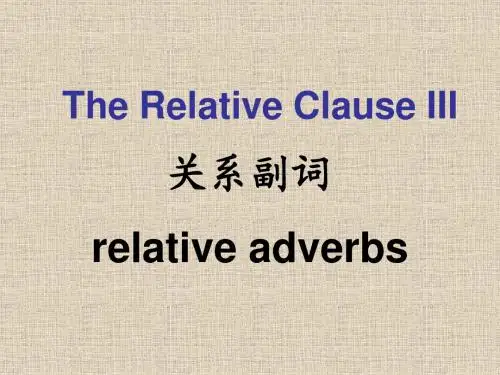
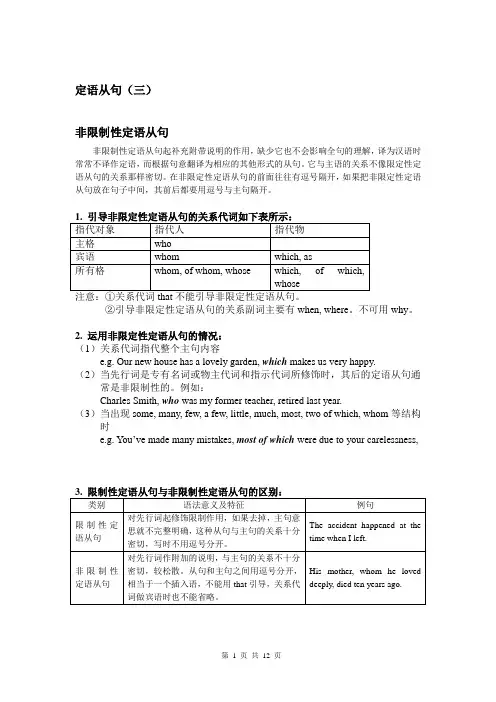
定语从句(三)非限制性定语从句非限制性定语从句起补充附带说明的作用,缺少它也不会影响全句的理解,译为汉语时常常不译作定语,而根据句意翻译为相应的其他形式的从句。
它与主语的关系不像限定性定语从句的关系那样密切。
在非限定性定语从句的前面往往有逗号隔开,如果把非限定性定语从句放在句子中间,其前后都要用逗号与主句隔开。
②引导非限定性定语从句的关系副词主要有when, where。
不可用why。
2. 运用非限定性定语从句的情况:(1)关系代词指代整个主句内容e.g. Our new house has a lovely garden, which makes us very happy.(2)当先行词是专有名词或物主代词和指示代词所修饰时,其后的定语从句通常是非限制性的。
例如:Charles Smith, who was my former teacher, retired last year.(3)当出现some, many, few, a few, little, much, most, two of which, whom等结构时e.g. You’ve made many mistakes, most of which were due to your carelessness,非限制性定语从句主要在以下方面不同于限制性定语从句:⑴非限制性定语从句和主句的关系不十分密切,它不是对先行词进行修饰或确定,只是对先行词作些附加的说明。
专有名词通常被非限制性定语从句所修饰。
例如:地名,人名,国家名等。
⑵非限制性定语从句不是先行词必不可少的修饰语,因此如果去掉从句,主句的意思仍然清楚。
⑶从句和主句之间往往用逗号分开,翻译时复合句通常译成两句话。
⑷与限制性定语从句一样,非限制性定语从句也可用关系代词who, which, whom, whose, as 和关系副词when, where, why 引导。
that不引导非限制性定语从句。
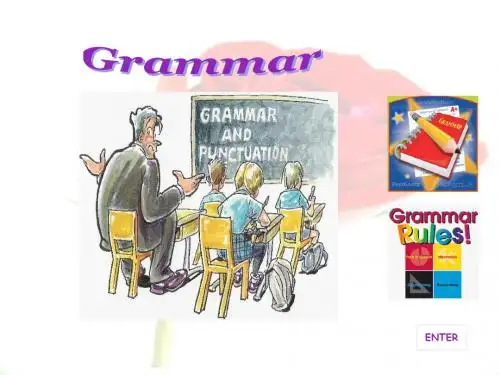
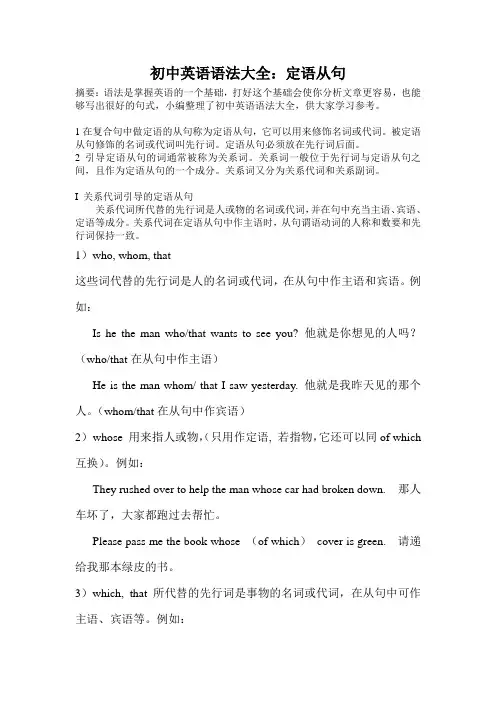
初中英语语法大全:定语从句摘要:语法是掌握英语的一个基础,打好这个基础会使你分析文章更容易,也能够写出很好的句式,小编整理了初中英语语法大全,供大家学习参考。
1在复合句中做定语的从句称为定语从句,它可以用来修饰名词或代词。
被定语从句修饰的名词或代词叫先行词。
定语从句必须放在先行词后面。
2引导定语从句的词通常被称为关系词。
关系词一般位于先行词与定语从句之间,且作为定语从句的一个成分。
关系词又分为关系代词和关系副词。
I 关系代词引导的定语从句关系代词所代替的先行词是人或物的名词或代词,并在句中充当主语、宾语、定语等成分。
关系代词在定语从句中作主语时,从句谓语动词的人称和数要和先行词保持一致。
1)who, whom, that这些词代替的先行词是人的名词或代词,在从句中作主语和宾语。
例如:Is he the man who/that wants to see you? 他就是你想见的人吗?(who/that在从句中作主语)He is the man whom/ that I saw yesterday. 他就是我昨天见的那个人。
(whom/that在从句中作宾语)2)whose 用来指人或物,(只用作定语, 若指物,它还可以同of which互换)。
例如:They rushed over to help the man whose car had broken down.那人车坏了,大家都跑过去帮忙。
Please pass me the book whose (of which)cover is green.请递给我那本绿皮的书。
3)which, that所代替的先行词是事物的名词或代词,在从句中可作主语、宾语等。
例如:A prosperity which / that had never been seen before appears in the countryside.农村出现了前所未有的繁荣。
第三讲定语从句定语从句必备知识1.定语从句在复合句中,修饰名词、代词或整个句子的从句叫作定语从句。
定语从句可以分为限制性定语从句和非限制性定语从句。
The boy who is reading needs the pen which you bought yesterday.那个在阅读的男孩需要你昨天买的钢笔。
(定语从句作后置定语)2.先行词被定语从句所修饰的词或句子叫先行词,作先行词的可以是:(1)一个词(通常是名词,也可以是代词)This is the place which is worth visiting.这是值得参观的地方。
He laughs best who laughs last.谁笑到最后,谁笑得最好。
(2)一个短语Many life's problems which were solved by asking family members, friends or colleagues are beyond the capability of the extended family to resolve.许多以前可以通过询问家庭成员、朋友或者同事就能解决的生活问题,是现在的大家庭无力解决的。
(3)一个分句The Greeks assumed that the structure of language had some connection with the process of thought, which took root in Europe long before people have realized how diverse languages could be.希腊人认为,语言结构和思维过程之间存在着某种联系。
这一观点在人们尚未认识到语言的千差万别以前就早已在欧洲扎下了根。
(4)一个完整的句子I found an old man lying on the ground and I took him to hospital in a taxi immediately, which was why I was late that morning.我发现一个老人躺在马路上,我立即乘出租车把他送到了医院,这就是那天上午我迟到的原因。
初识定语从句一、了解定语从句及相关术语1. 定语从句:修饰一个名词或代词的从句称为定语从句,一般紧跟在它所修饰的先行词后面,相当于形容词在句中作定语。
2. 先行词:被修饰的名词或代词叫先行词。
3. 关系词:引导定语从句的关联词称为关系词。
关系词有关系代词和关系副词。
关系代词有that,which,who,whom,whose,as等;关系副词有where,when,why等。
关系词有三个作用:1.连接作用(即引导定语从句)。
2.代替先行词3在定语从句的担当一个成分。
He is the man who I want to see.他就是我想见的人。
先行词关系词定语从句二、掌握关系代词及其作用最常用的关系代词是who, whom, whose, that,which和as。
关系代词同时起了两个作用。
它们可以像别的代词一样,可以代表一个名词,在定语从句中用作主语或宾语,同时,它们又起到了连词的作用,把主句和从句连接起来。
1. who指人,在定语从句中一般做主语。
如:Do you know the man who is speaking to your father? 你认识和你爸爸讲话的那个人吗?(定语从句修饰先行词the man,who在定语从句中作is speaking的主语)This is the stranger who helped us yesterday. 这是昨天帮助我们的那个陌生人。
She is the girl who works hard at maths. 她就是那个努力学习数学的女孩。
2. whom指人,在定语从句中作宾语。
在口语或非正式文体中,whom可以省略。
如:He is the man (whom) we just talked about. 他就是我们刚才谈论的那个人。
The boy (whom) we met in the street yesterday is my classmate.我们昨天在大街上遇到的那个男孩是我的同学。
定语从句的用法归纳总结1定语从句定语从句是指作为句子的一部分,主要用来修饰名词或代词的从句,表示这个名词或代词所指的人或物。
它是由关系词和形容成分(名词、代词、副词及短语)构成的。
关系词也称为“连接词”、“关联词”(relative words),它有几十种,主要有:that,which,who,whom,whose,as,when,where,why等。
2定语从句的分类(1)根据关系词的用法可以分为定语从句和同位语从句两大类:定语从句:用关系词作句子成分,修饰主句中某个名词或代词,以及表示名词或代词所指的人或物。
同位语从句:用关系词引导的从句,句中某个名词或代词的意义由其后的从句来补充说明,以此来表达进一步的意思。
(2)根据句中关系词的所指数目可以分为两种:定语从句:句中关系词指代单数名词或代词同位语从句:句中关系词指代复数名词或代词3定语从句的用法(1)that引导的定语从句:that引导定语从句可以指代人或物,也可以指代抽象概念,如idea、fact等。
有时可以省略that引导的定语从句,但要注意that 引导的定语从句在口语中通常不省略。
(2)which引导的定语从句:which引导的定语从句通常只能指代物,而不能指代人,故不能用来替换who或whom,但可以替换that。
此外,在对话语言中,which 引导的定语从句可以指代人,而且一般不可以省略。
(3)whose引导的定语从句:whose引导的定语从句用以表示某人、某物或某事所属的所有者,常用来替换whoever和whatever,但不能用来替换they。
(4)when/where引导的定语从句:when/where引导的定语从句可以用来表示时间和地点,即问句中的时间和地点。
(5)as/than引导的定语从句:as/than引导的定语从句一般用来比较两个事物,故它们往往出现在类似“as…as”或“not as/so…as”这样的句型中。
定语从句I think that I am right.The man who is standing on the stage is a teacher.关系词:关系代词、关系副词一、关系代词指人:who / whom(宾语)/ that指物:that / which指......的:whose1、Jack lives here.Jack is my friend.Jack who / that lives here is my friend.2、They're looking for a missing boy.The missing boy is my brother.The missing boy who / that / whom they are looking for is my brother.The missing boy they are looking for is my brother.3、They're the birds.I fed the birds this morning.They're the birds that / which I fed this morning.They're the birds I fed this morning.4、whose代替his / her / my / your /its等1)She is a novelist.Her book won several prizes.She is a novelist, whose book won several prizes.2)He is an expert.We want his advice.He is an expert, we want whose advice. ×whose we want advice. ×whose advice we want. √3)This is the house.Its windows were broken.The windows of the house were broken.This is the house, whose windows were broken.This is the house, the windows of which were broken.This is the house, of which the windows were broken.用X代替任意名词:whose X = the X of which (whom) = of which (whom) the X 练习1:1. We are studying in a reading-room, the doors ________ are made of glass.A. of thatB. thatC. of whichD. which2. Recently I bought an ancient Chinese vase, ________ was very reasonable.A. which priceB. the price of whichC. its priceD. the price of whose3. The book, ________ is yellow, is mine.A. the cover of itB. the cover of whichC. whose the coverD. of which coverthat和which的区别:☆以下情况只能用that:1、当先行词为all / everything / anything / nothing / the one / little / much等或有人有物时,一般只用thatThis is all that I want to say.They talked for about an hour of things and persons that they remembered in the school.2、当先行词被all / any / every / no / some / little / much / the only / the very / the last / 序数词及最高级修饰时,一般只用thatYou can take home any / every book that you like.This is the best film that I have ever seen.☆以下情况只能用which:1、介词+ which2、非限制性定语从句中,逗号后面用which练习2:1. We talked about the books and writers ________ we knew.A. whichB. whoC. whomD. that2. This is the very book ________ I want of find.A. thatB. whichC. itD. with which3. The most important thing ________ we should pay attention to is the last part of the report ________ has beencapitalized.A. which, thatB. that, whichC. which, whichD. that, that二、介词+which结构和关系副词关系副词:when / where / why介词后面只能接which,不能接that1、I still remember the day.I first met her on the day.I still remember the day that / which I first met her on.I still remember the day on which I first met her.I still remember the day when I first met her.练习3:1. February is the only month ____ has fewer than 30 days.2. September 18, 1931 is the day ____ we'll never forget.3. I will never forget the day ____ I joined the Party.2、This is the city.I live in the city.This is the city that / which I live in.This is the city in which I live.This is the city where I live.练习4:1. I like to shop at stores ____ have products from different countries.2. I like to shop at stores ____ I can find products from different countries.3、the reason why结构Do you know the reason?He was late for the reason.Do you know the reason which he was late for?Do you know the reason for which he was late?Do you know the reason why he was late?三、介词+which / whom结构1、Stephen is the person.I work with the person.Stephen is the person whom I work with.Stephen is the person with whom I work.2、This is the pan.I boil the milk in the pan.This is the pan which I boil the milk in.This is the pan in which I boil the milk.练习5:1. Could you lend me the knife ____ I can cut it.2. The novel, ____ the film is based, is very moving.3. Do you have a telescope ____ we can study the sky.4. Please pass me the notebook ____ you found the lyrics.试比较:Is this factory the one we visited last year?Is this the factory which / that we visited last year?练习6:Is this book ____ you want to borrow?A. thatB. whichC. the oneD. \四、限制性定语从句与非限制性定语从句1、定义1)限制性定语从句:一般无逗号分隔,对先行词严格限制2)非限制性定语从句:一般有逗号分隔,对先行词做补充说明2、非限制性定语从句中的关系词1)非限制性定语从句中无that, why练习7:1. "Who Moved My Cheese?", ________ is a best - selling book, is written by Spencer Johnson.A. whichB. thatC. itD. what2. Mr. Wu, ________ everybody likes, is going to give us a talk on chemistry.A. whomB. thatC. whichD. /2)非限制性定语从句中关系词一律不准省略3、非限制性定语从句中的which(这一点)和as(正如)1)在非限制性定语从句中,which不仅可以替代名词或代词,还可以替代逗号前的一句话,译为“这一点”This is a shop, which sells PC.She married G. C., which surprised everyone.2)as也可以替代一句话,译为“正如”,常用于固定结构as is well known, as is known to all, as everybody knows,(众所周知)as is expected, as happened before, as has been pointed out,练习8:1. ________ is known to everyone, the moon travels round the earth once every month.A. ItB. AsC. ThatD. What2. Sometimes the earthquake is so violent that it can destroy the whole city, ________ happened in Tangshan, in1976.A. asB. thatC. whereD. like3. The writer has written quite a few books now, ________ his teachers and parents didn't expect.A. thatB. asC. of whichD. which4. ________ has been announced, we shall have our final exam next term.A. ThatB. AsC. ItD. What5. In one night, the city was completely destroyed by a terrible earthquake, ________ about 240 000 people died.A. whichB. whenC. in whichD. in that4、of which / whom结构:在非限制性定语从句中,下列词可以和of which / whom连用,表示比例关系:√each, some, any, several, many, much, a few, half, most, all√分数,百分数,数词及最高级等I bought many books, which are about English learning.two of which ..., half of which ..., most of which ..., some of which ..., none of which ...练习9:1. The old man has two sons, ________ is a soldier.A. one of whomB. both of themC. all of whomD. none of them2. New York is famous for its sky-scrapers, ________ has more than 100 storeys.A. the higher of themB. the highest of whichC. the highest of themD. some of which3. He has two sons, ________ work as chemists.A. two of whomB. both of whomC. both of whichD. all of whom5、think / say / believe型:1)Jack lives here.Jack is my friend.Jack who lives here is my friend.2)I think Jack lives here.Jack is my friend.Jack who I think lives here is my friend.练习10:1. He often helps the students ________ he thinks are not quick at their studies.A. whomB. whoC. whenD. because2. This is Mr. Smith, ________ I think has something interesting to tell us.A. whoB. whomC. thatD. /3. I will hire the man ________ they say is a good English speaker.A. whoB. thatC. whichD. whom6、the way当the way表示“......方式”时,可以用the way that / in which练习11:1. I don't like the way ____ you speak to her.A. \B. thatC. in whichD. All A, B and C2. Can you tell me the name of the factory ________ you paid a visit last week?A. whatB. whichC. to whichD. to that3. Didn't you see the man ________?A. I nodded just nowB. whom I nodded just nowC. I nodded to him just nowD. I nodded to just now4. In the dark street, there wasn't a single person ________ she could turn for help.A. thatB. whoC. from whomD. to whom定语从句专项练习题1. Nearly all the streets are in straight lines, ________ from east to west. Those ________ run from north to south are called avenues.A. running; thatB. run; whoC. running; whoD. run; that2. This is the case ________ he’s had all his money stolen.A. whenB. whereC. thatD. on which3. Mr. Smith will pay a visit to Beijing this autumn, ________ we will enjoy the Olympic Games in 2008.A. whereB. whenC. whichD. how4. The artist will not paint people or animals but he will paint anything________ .A. that the little girl asks himB. the little girl asks him toC. for the little girl to ask himD. what the little girl asks him5. —How did you get in touch with the travel agent, Robin?—Oh, that’s easy. I surfed the Internet and then called one _______ the telephone number is provided.A. whichB. in whichC. of whichD. whose6. October 15th is my birthday, ________ I will never forget.A. whenB. thatC. whatD. which7. The treatment will continue until the patient reaches the point ______ he can walk correctly and safely.A. whenB. whereC. whichD. whose8. There are several research centers in China ________ a certain disease called Bird Flu is being studied.A. whichB. whereC. whenD. what9. I hope that the little ________ I have been able to do does good to them all.A. whichB. whatC. thatD. when10. The time is not far away ________ modern communications will becomewidespread in China’s vast countryside.A. asB. whenC. untilD. before11. ________ is known to everybody, Taiwan is a part of China. We must unify it.A. ItB. AsC. WhichD. What12. I shall never forget the day ________ Shen Zhou V was launched, ________ has a great effect on my life.A. when, whichB. that, whichC. which, thatD. when, that13. The bread my wife makes is much better than ________ you can buy at a store.A. that whichB. one thatC. that of whichD. this of which14. There is no such place ________ you dream of in all this world.A. thatB. whatC. whichD. as15. The people, ________ had been damaged by the flood, were given help by the Red Cross.A. all whose homesB. all of whose homesC. all their homesD. all of their homes16. The humans are destroying nature day by day, ________ of course, will cause severe punishment from it sooner orlater.A. whoB. whenC. on whichD. which17. Is this research center ________ you visited the modern equipment last year?A. whereB. thatC. the one thatD. the one where18. Some pictures of the river brought the days back to the old ________ they swam in it.A. whenB. thatC. whoD. Where。
矿产资源开发利用方案编写内容要求及审查大纲
矿产资源开发利用方案编写内容要求及《矿产资源开发利用方案》审查大纲一、概述
㈠矿区位置、隶属关系和企业性质。
如为改扩建矿山, 应说明矿山现状、
特点及存在的主要问题。
㈡编制依据
(1简述项目前期工作进展情况及与有关方面对项目的意向性协议情况。
(2 列出开发利用方案编制所依据的主要基础性资料的名称。
如经储量管理部门认定的矿区地质勘探报告、选矿试验报告、加工利用试验报告、工程地质初评资料、矿区水文资料和供水资料等。
对改、扩建矿山应有生产实际资料, 如矿山总平面现状图、矿床开拓系统图、采场现状图和主要采选设备清单等。
二、矿产品需求现状和预测
㈠该矿产在国内需求情况和市场供应情况
1、矿产品现状及加工利用趋向。
2、国内近、远期的需求量及主要销向预测。
㈡产品价格分析
1、国内矿产品价格现状。
2、矿产品价格稳定性及变化趋势。
三、矿产资源概况
㈠矿区总体概况
1、矿区总体规划情况。
2、矿区矿产资源概况。
3、该设计与矿区总体开发的关系。
㈡该设计项目的资源概况
1、矿床地质及构造特征。
2、矿床开采技术条件及水文地质条件。